Ni Sano, Ni Sagrado
Ni Sano, Ni Sagrado Y Sin Miedo Al Diablo
Dinámicas de poder en una sociedad Chicha
Yo crecí en Lima durante los violentos anos 80 bajo el sonido de las bombas terroristas, y la sonada crisis económica que nos dejo viviendo en gran incertidumbre, y se manifesto en guerra política y social. Esta incertidumbre, aunque sin coches bomba, aun se vive en el Peru, donde la pobreza económica es la razón por la cual mucha gente vive sin tener qué comer al día siguiente.
El destino del Peru ya es conocido por los elementos de la naturaleza, solo basta observarlos y se vera claramente hacia dónde vamos. La forma como co-existimos como ciudadanos y la forma como interactuamos con la naturaleza, define nuestro presente y futuro.
El Peru es una tierra surreal, extrema y de contrastes gigantes, en términos morales, politicos, culturales, estéticos, geográficos e históricos. Estamos cerca y lejos, luchando juntos pero sin entendernos, unos encima de otros, sin percatarnos que tenemos alguien adelante del camino y alguien atrás. Percibo una extrema indiferencia hacia el sufrimiento de los demás, indiferencia frente al abuso, o tal vez es un cansancio por el largo tiempo de opresión sufrida. Percibo que se trata de una condición aprendida históricamente. En la época colonial aprendimos a subyugar y ser subyugados, a discriminar y ser discriminados. Esto aun se siente en la política, como en las costumbres.
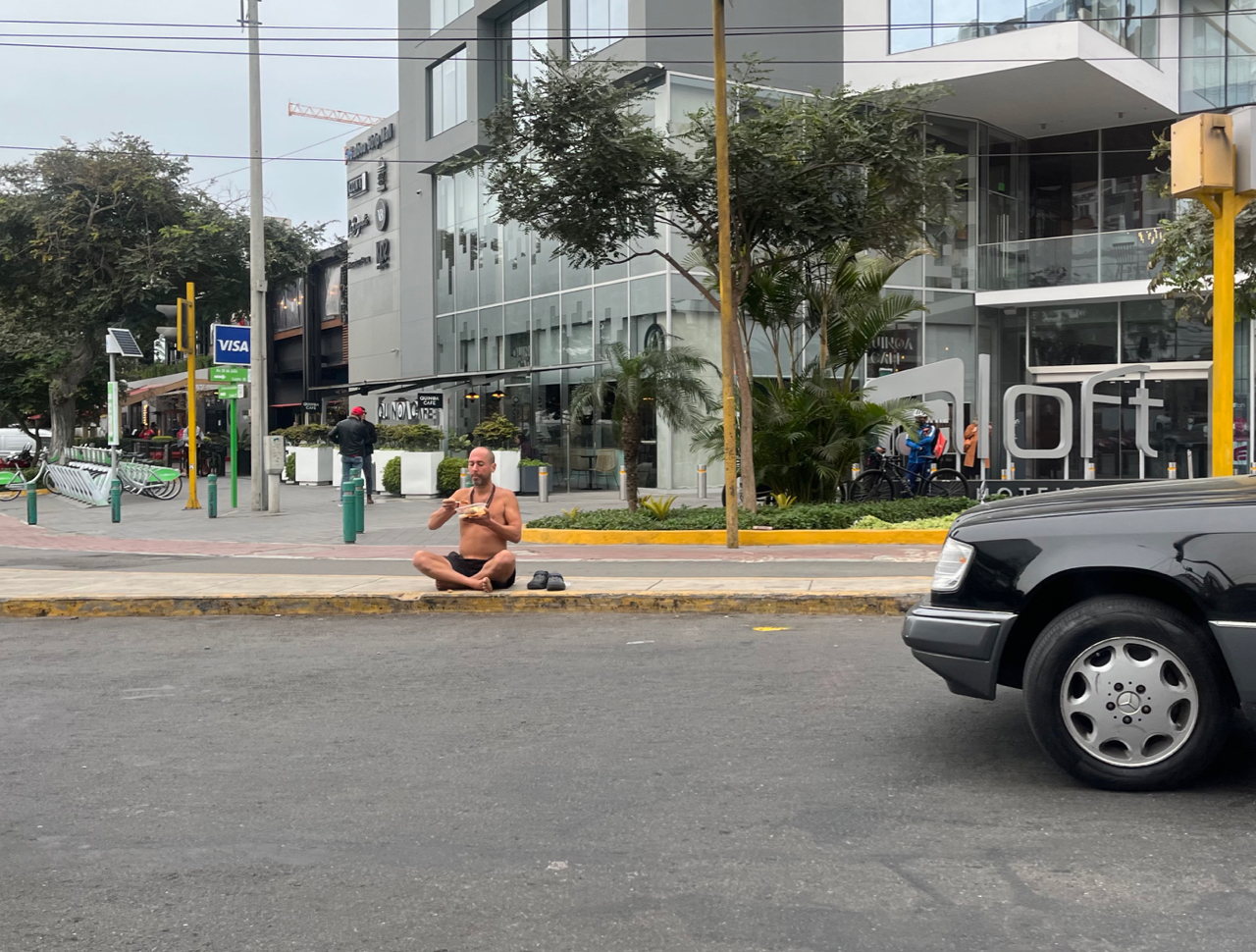
Posteriormente durante los primeros años de la republica Peruana la elite gobernante, claramente blanca, criolla y de tendencia aristocrática se distancia mucho del Ande y de la Amazonia, olvidando la vida de la población campesina e indígena. Este olvido o negligencia frente a las necesidades de compatriotas en lugares lejanos a la capital, mantuvo el racismo y discriminacion cotidiana hacia lo provinciano, pero sobretodo un gran abandono hacia esas poblaciones. La elite hizo como si no existiesen, como si no fueran parte del país. El abandono derivo muchas veces en odio, ofensa, invisibilizacion de la pobreza, y devaluación de la vida de seres humanos. Esto definió el proceso de sobrevivencia en el Ande y en la Amazonia, sobrevivencia frente a la miseria, y una política de negligencia que se sigue viviendo hasta nuestros días. La cual ademas, ha motivado la creación de grupos guerrilleros, terroristas que usan la miseria para crear caos en el país.
El distanciamiento físico entre regiones cambio durante el siglo pasado, cuando por motivos económicos y politicos hubo una gran migración del interior del país hacia la capital. Aquí nació el “Cholo” y la “choledad”, aquella existencia de provinciano migrante en la gran ciudad criolla, a la cual se debe enfrentar y dónde debe lograr una nueva vida. Lima se ha formado en su mayoría gracias a migrantes provincianos. No hay un barrio sin migrantes. Y muchos teniendo un espíritu luchador han construido y dejado un legado muy valioso para la sociedad. No obstante, en Lima tuvimos que aprender a convivir todas las culturas juntas, en una especie de sopa, de amalgama o mixtura no deseada por muchos. Convivimos sin gustarnos, discriminándonos y olvidándonos. Sin embargo nos terminamos pareciendo mucho unos a otros, y aunque no lo queramos nos descubriremos siempre en aquel que consideramos diferente a uno mismo. Porque nos une el contexto, la mixtura de culturas, que forma una amalgama y que aunque queramos diferenciarnos terminamos naciendo de esa misma mescolanza. Esto genera confusion, a veces el rechazo propio, la necesidad de blanqueamiento, o a veces el refugiarse en los orígenes; y se forma una cultura del abuso y miedo a ese panopticum social del cual nadie escapa. Nada es desconocido, al mismo tiempo no todo es querido.
A esa amalgama y panopticum social se le apoda de Chicha en el Peru de hoy. La chicha es una bebida ancestral andina, básicamente hecha de maíz, pero también contiene otros ingredientes que se mezclan con el maíz. Existe también un estilo musical que mezcla la música andina como el huayno, la cumbia tropical y el rock; y también se le llama chicha. Chicha es entonces la mezcla. De allí que a la mezcla social se le llame también cultura Chicha, que es necesaria para la convivencia en nuestro país. Esa mezcla crea una cultura de la adaptación de los valores y estética de los migrantes a la vida en la capital. La adaptation se da en varios aspectos, y en todos los estratos sociales.
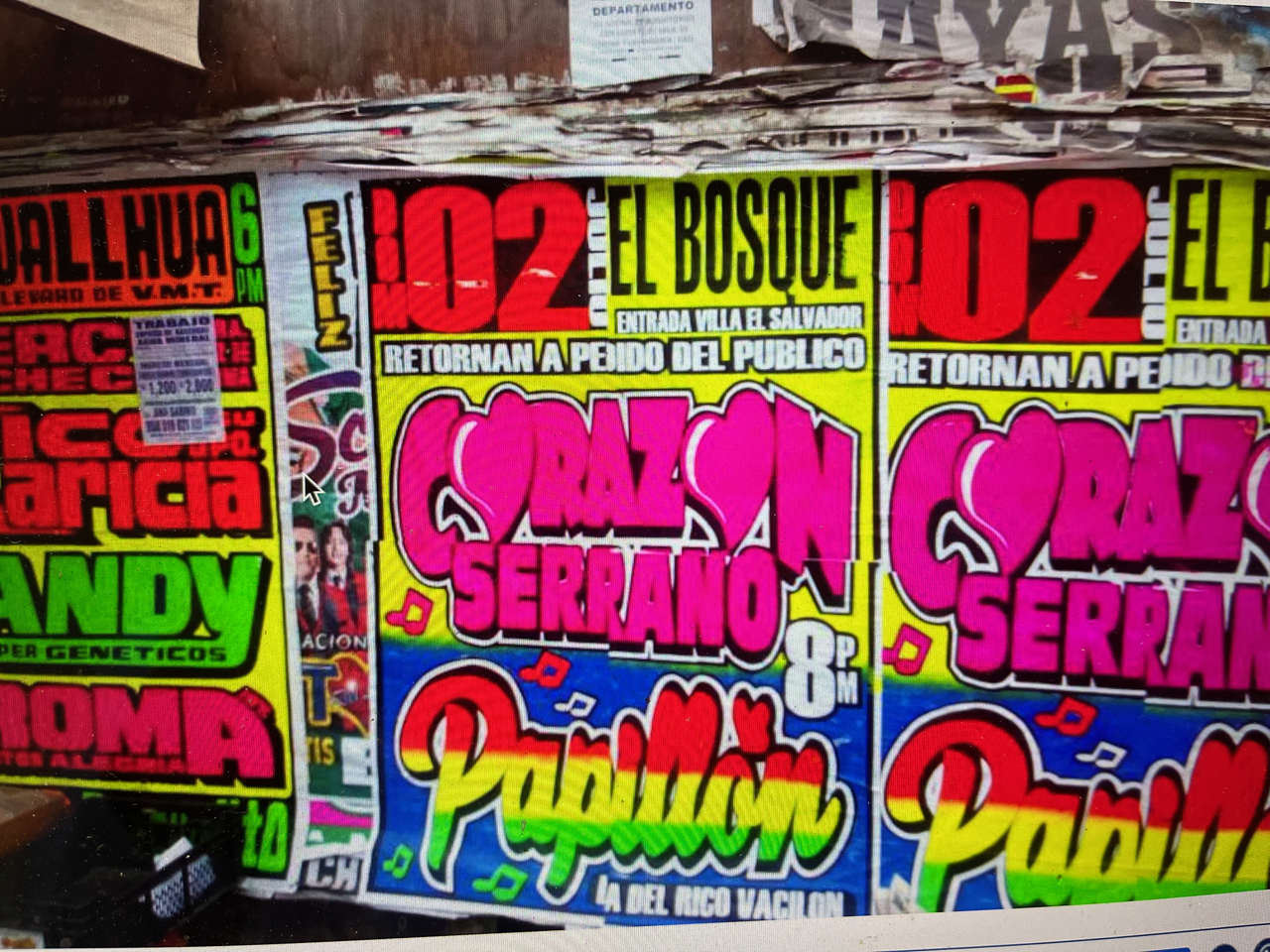
**Herencia colonial en lo politico**En este mundo de lo no querido con lo cual se debe convivir, se manifiesta la transgresión como algo natural. En lo politico existe una herencia de la época colonial, donde los abusos humanos eran normalizados para mantener el poder en la elite virreinal. La población indígena fue explotada, marginalizada y finalmente olvidada. explotada, marginalizada y finalmente olvidada. explotada, marginalizada y finalmente olvidada. explotada, marginalizada y finalmente olvidada. Siglo tras siglo. Cacofonicamente se dio una transgresión de sus derechos humanos. Ahora en épocas republicanas supuestamente democráticas la transgresión es algo del día a día.
Actualmente hemos llegado al extremo en que la población termina aceptando el robo o la corrupción del politico. “Roba pero hace obra” se escucha de algunos cuando hablan de sus politicos favoritos. Así se transgrede la función organizadora de las instituciones democráticas del estado, y se viola la dignidad de toda la población. La aceptación de la transgresión, es natural en esta sociedad de sobrevivencia, pero termina siendo una practica lúdica en la sociedad Chicha. Termina siendo una especie de juego de poder. Véase sino la lista de presidentes que están siendo procesados o ya han sido culpados o encarcelados por corrupción, lavado de dinero, trafico de influencias y hasta abuso de derechos humanos. Terminamos aceptando que no hay otras opciones. El pesimismo nos puede inundar: Qué otro tipo de “líder” podría nacer de una guerra? O es que aun podremos encontrar nuevos heroes que sanen a nuestro país violentado?
Muchos “Cholos” sienten la necesidad de revertir esta opresión de la colonialidad que discrimina lo que no sea blanco. Al llegar el Cholo al poder, se da una transgresión al status quo, por llegar al poder aquel considerado como marginal. Sin embargo el gobernante Cholo, en su mayoría hombre, se ha demostrado igualmente capaz de robar del estado. Muchos justifican su transgresión adulando el querer revertir el status quo de la colonialidad. Pero las razones no justifican los hechos. Recuperarse de una transgresión no sera posible con otra transgresión. El Cholo gobernante llega a ser más odiado aun que sus antecesores blancos, porque siendo que el transgresor proviene del estrato sociopolitico reconocido como marginal, su transgresión es aun mas odiada por la clase alta. Y esto destruye toda confianza en aquel “Cholo sano y sagrado”, sucesor de Pachacutec, porque demostró ser igual de ladrón que los blancos conquistadores. Estamos en un ciclo vicioso de la dinámica oscura del poder.
Existe también una clase media y la clase alta que cuenta con personas educadas en las mejores universidades del mundo, y con conocimientos de planificación estratégica y vision de país. Sin embargo para este grupo, entrar en el mundo politico significa entrar en un en el cual se termina uno metamorfoseado en caviares, tránsfugas, lagartos, porkys, entre otros animales de la fauna política Peruana. Pero de la cual no se escapa aunque se este lejos, porque todos somos producto de esa política, que nos hace abyectos y miserables. Ya que hasta terminamos aceptando o perdonando a aquellos politicos que alguna vez robaron de las arcas del estado, porque finalmente “hicieron obra”? Que obra puede ser buena cuando el que la hizo al mismo tiempo robo del presupuesto y así impidió el desarrollo completo del objetivo.
Obviamente esta actitud resignada de la población es consecuencia de un largo abuso de poder, que devino en vicio y costumbre y finalmente en practica cotidiana. Actualmente, el abuso constante a dejado inerte, sin esperanza y casi impotente a gran parte de la población. El Peru se desbarata, las instituciones del estado están violentadas, y dejan de funcionar para construir al país, pero funcionan para que una mafia se alimente de los recursos del estado a vista de todos. El gobernante esta garantizado de impunidad, y es complicado iniciarle un proceso legal. Y la población calla.
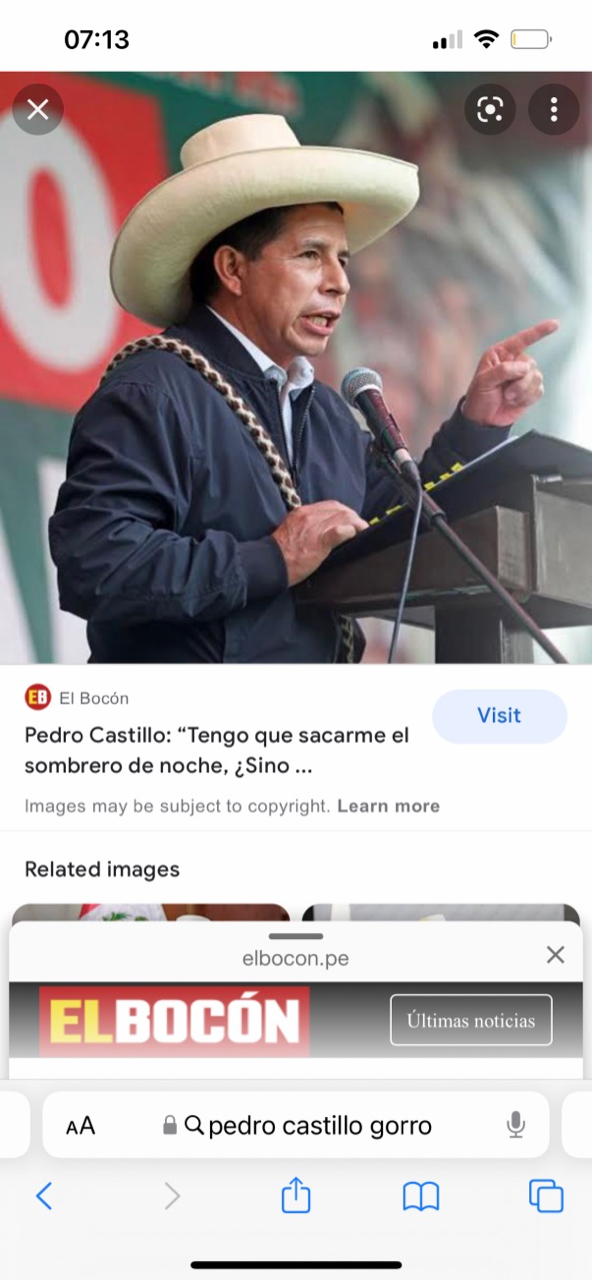
En esta sociedad Chicha aquellos que abusaron, se cobijan como víctimas; y aquellos que fueron abusados tratan de justificar su lucha por la justicia pero terminan silenciados. El poder ha caído en manos oscuras y sucias, ya desde siglos atrás, pero esta corrompiendo y denigrando cada vez mas a la población. Una población que ademas de ser denigrada, también sabe transgredir y reproducir practicas discriminatorias, de generación en generación. Reproduciéndose así estructuras sociales y dinámicas de poder destructivas. Como cambiar??? En algún momento seria bueno empezar a colocarnos en el zapato del otro y tratar de ser justos. Suena más fácil decirlo que hacerlo, cuando un parte importante de la población esta ciegamente comprometida con mantener el orden social.
Queda entender nuestra posición en estas dinámicas de poder. Cuál es nuestro rol en todo esto? cómo podemos tomar una distancia saludable de esa dinámica? como aportar a la creación de un nuevo orden? uno más justo, menos violento, más amable.
Tal vez fijémonos en nuestro día a día, en la pequeñas acciones que como gotas labran la piedra de la sociedad peruana.
**Herencia colonial en las costumbres y entretenimiento**
En la ciudad se interrumpe ese fluir calmo del espíritu que se puede sentir en la montaña Andina. En la ciudad de Lima hay una barrera, se corta la comunicación entre el ser humano y la naturaleza. Esto sucede mucho en varias zonas urbanas. De lo que éramos uno, -el cerro, la flor, la oveja, las maderas de la casa, el grano de maiz, el sudor y la mujer del campo-, terminamos fragmentados en piezas individuales cada uno con un objetivo solitario. Lima se convierte en un lugar donde cohabitan millones de sueños individuales. Y no existe mas el objetivo común, el ayllu o la comunidad. La colonia nos enseño a separarnos, a vernos como diferentes el uno del otro, individuos con fenotipos distintos y por lo tanto capacidades distintas y como consecuencia destinos muy diferentes. Como si eso ya estuviese marcado por definición divina.
- La relación con el animal como símbolo de la relación con la naturaleza*
Un ejemplo de esa fractura en armonía de la coexistencia es la Tauromaquia, celebrada en España, y heredada en el Peru por haber sido el centro colonial mas importante en Sudamerica. Se difundió y estableció fuertemente en Cajamarca. Donde la población tanto urbana como rural, aun disfruta mucho de ese espectáculo.
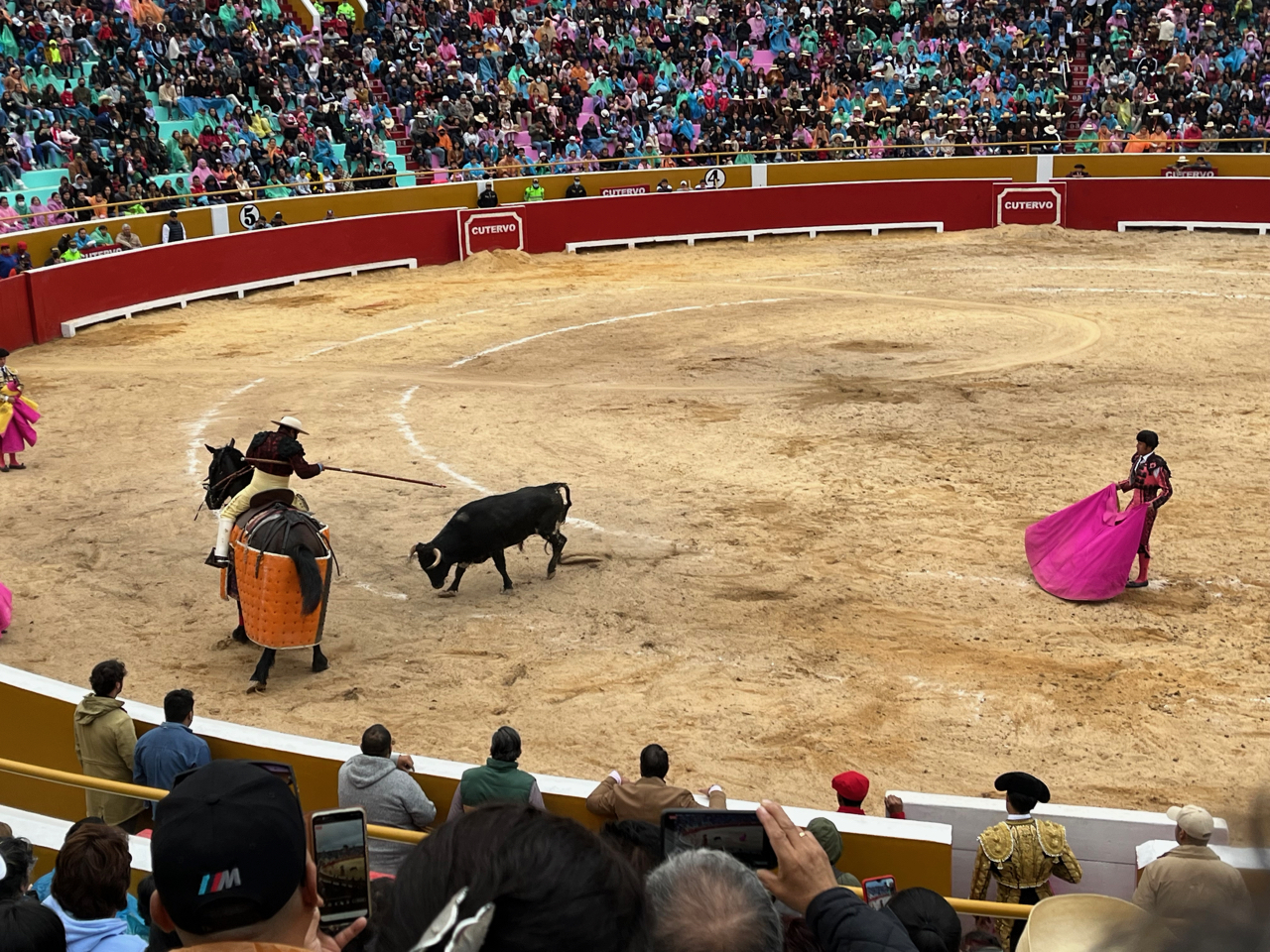
Por ejemplo en la zona urbana de Cutervo se celebra la corrida de toros, durante las fiestas patronales de San Juan. Cuando fui testigo de esos momentos de agonía del animal, sentí el horror de la cultura colonial. No tengo nada en contra de quienes aman la tauromaquia, pero tengo una opinion muy diferente. Para mí, es una alineación muy grande del ser humano el disfrutar de la agonía y muerte de un ser viviente. Esta practica ignora por completo la espiritualidad de la cosmovision Andina, donde campos, tierra, animales y humanos son uno, interconectados en una simbiosis. En el pueblo urbano se rompe esa simbiosis. Aquí los Peruanos estamos masivamente lejos de nuestra Pachamama que nos vio nacer. El sacrificio del animal para el gozo visual y emocional del hombre tiene algo egocentrico y maquiavélico. En este ritual se pierde la conexión entre ser humano y planeta. Durante la corrida de toros nos volvemos extraños al mundo que nos vio nacer. Allí me surgen las preguntas: qué tan lejos estamos de la Pachamama en nuestro corazón? Cuanto nos distanciamos pensando que la podemos controlar, definir, terminar, transformar a nuestro gusto? Eso pensamos mientras que la Pachamama nos termina transformando a nosotros. Si ella muta nosotros mutamos con ella, lo que le hacemos lo hacemos a nosotros mismos. Es así que la matanza de toros maquiavélica, regresa a nosotros mil veces mas. No hay forma de escapar de ese karma tan duro.
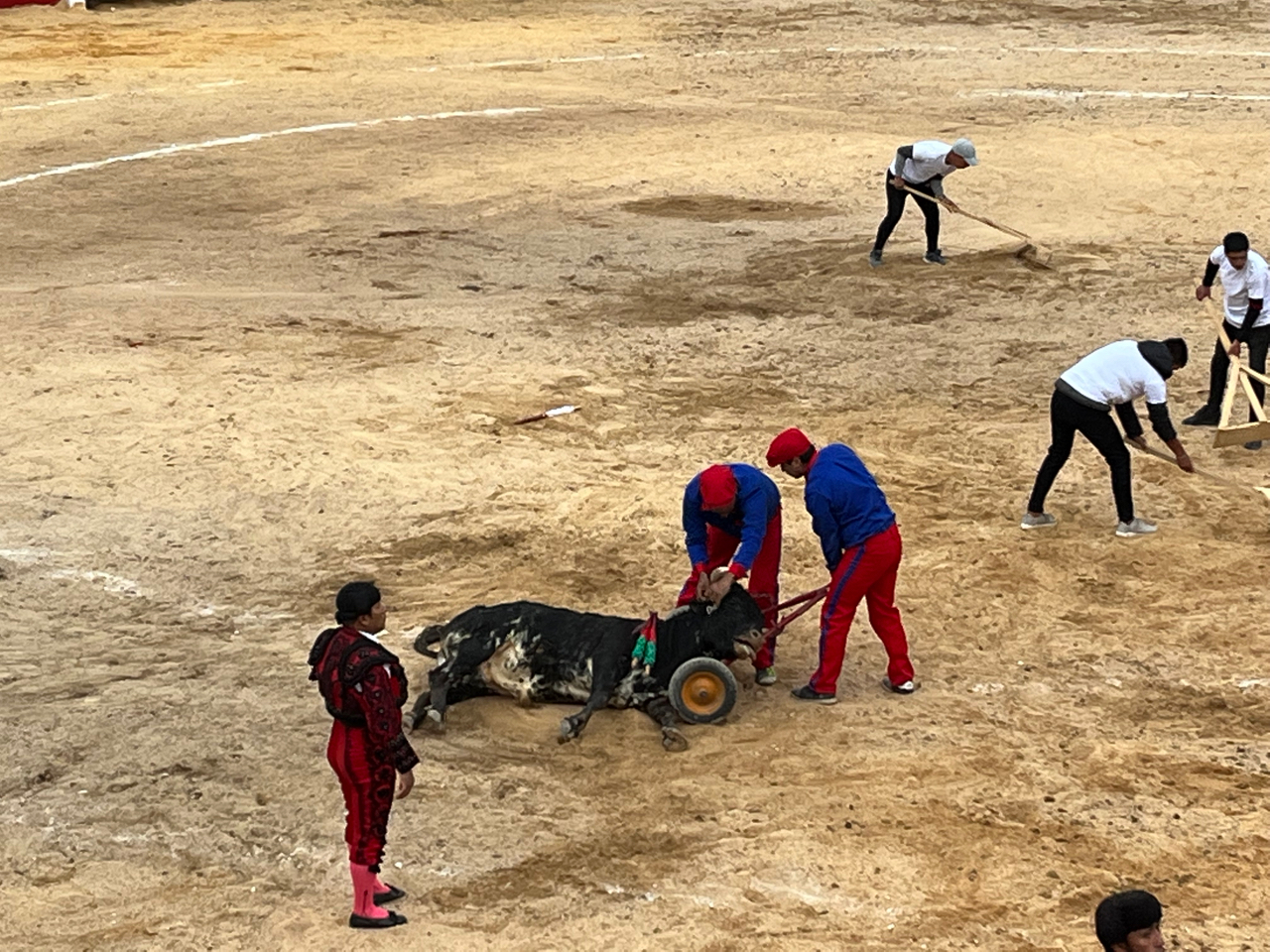
Tal vez es a traves de costumbres como estas, que nos hemos vuelto indolentes hacia el sufrimiento de nuestro prójimo. Nos hemos vuelto indiferentes frente al abuso, al crimen organizado del estado Peruano y sus secuaces. Así como nadie hace nada por salvar al toro de tremenda humillación y muerte, así nadie hace nada por salvar al Peru que se desbarata como una torre de juguete y termina aplastando a todos quienes están abajo. Y terminamos emigrando a otro país, desterrados en asilo o en un limbo migracional, sin raíces y a punto de colapsar en países extranjeros. Nos sacrificamos de la misma forma que sacrificamos al animal. Y eso es solo un ejemplo de cómo tratamos a la naturaleza. Porque hay muchos ejemplos más que se observan en forma irresponsable de las actividades extractivas de petróleo, gas y minerales. Así mismo el uso del agua y su cuidado como elemento natural esta en crisis. Y los bosques tropicales de la Amazonia en riesgo de extinción, junto con su biodiversidad.
La relación con las cosas
A pesar de la crisis ambiental en Peru, se pueden ver cada día más facilidades para que el cliente pueda incrementar el consumismo de bienes que tienen efecto directo en el medio ambiente.
Lima termina siendo una blasfemia frente a lo sagrado de la naturaleza y un antónimo a la cosmovision Andina. Las obras de infraestructura estremecen mis ojos por su fealdad, el trafico feroz y avenidas congestionadas llenas de smog inundan mis pulmones a la nausea. Pero todos tienen auto, a veces del año, ultimo modelo, aun cuando no tienen una casa donde vivir. Aquí se logra todo con dinero, hasta se puede comprar la autoria de una tesis en maestría pedagógica, un cuerpo de miss Universo, tarjetas de crédito para el mas pobre que termina endeudado al suicidio, y los postres mas seductores del planeta.
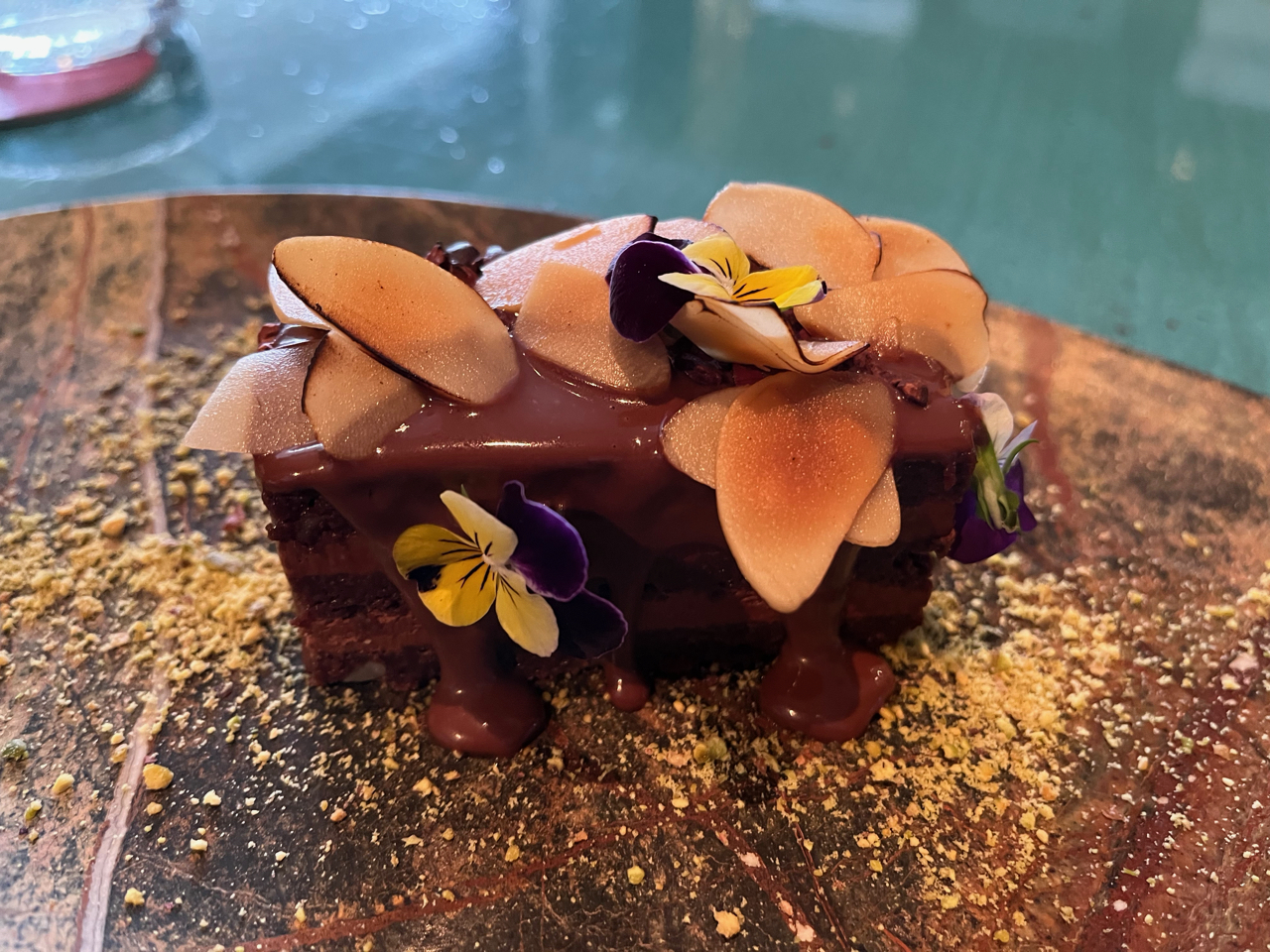
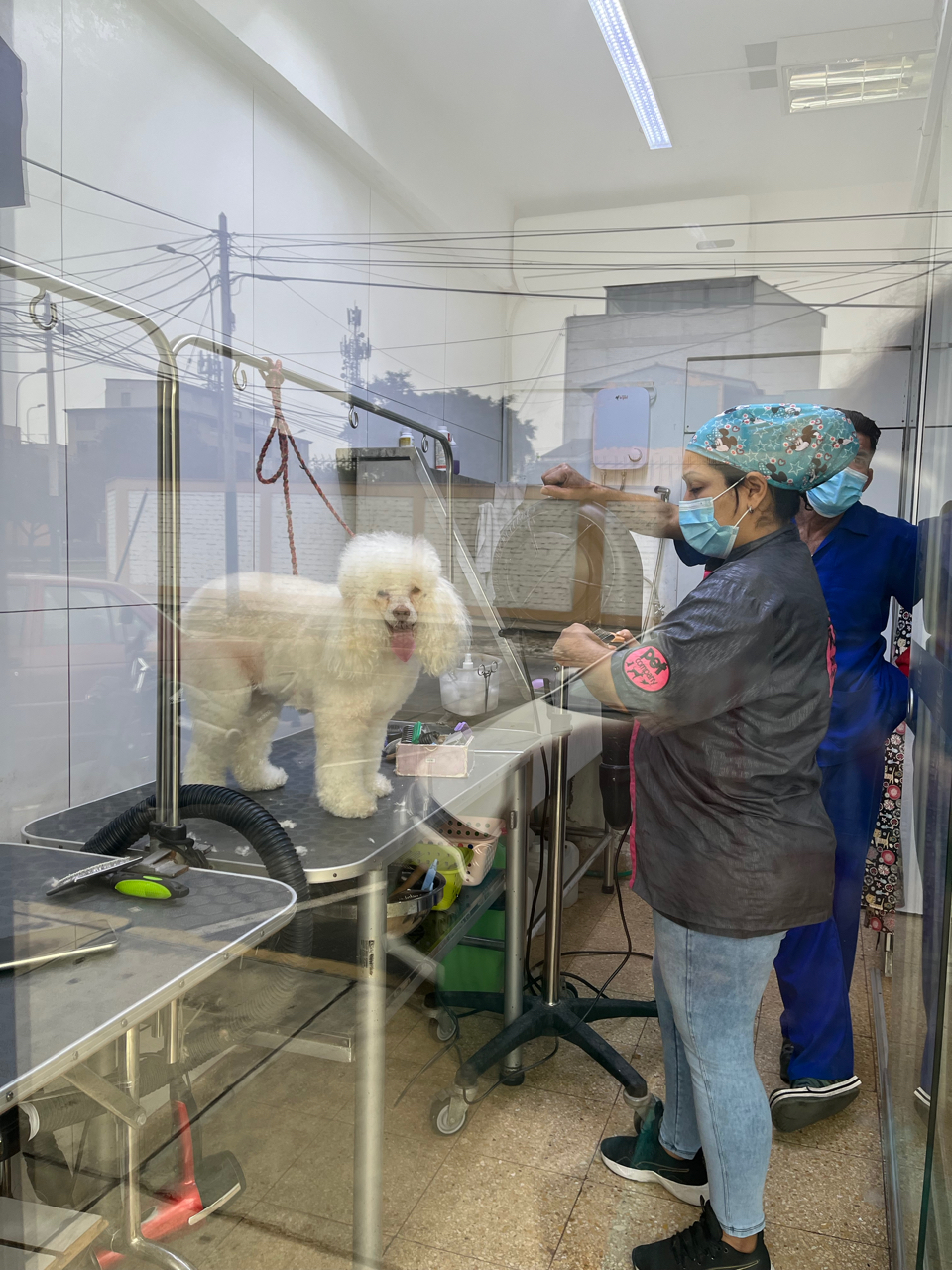
El consumismo es lo que nos mantiene en movimiento en la ciudad, comprar para mantener esa vida de apariencias, donde todos quieren aparentar ser exitosos a través de las cosas que tienen. Muy poco se relaciona al éxito con el nivel de conexion que uno puede tener con la naturaleza y con el cuidado de ella. Existe entonces una indolencia aprendida, desde siglos atras creada para no amar los elementos de esta tierra, que pareciera de nadie. No extraña entonces la indolencia frente a la pobreza y miseria de muchos. La indolencia ayuda a sobrevivir. La vida no para en Lima, todos corren hacia sus centros laborales cada manana, en donde viven explotacion. Los dueños sabiendo que no hay leyes que protejan al empleado, injustamente exigen lo imposible de sus trabajadores.
Y lamentablemente el éxito se relaciona a lo material, al salario, a las propiedades, cada día mas capitalistas siguiendo fieles los modelos de desarrollo extranjeros, que no tienen interés en cuidar el medio ambiente o de las relaciones sociales. No tienen nada en común con nuestra ancestralidad y sabiduría milenaria.
Existe la esclavitud frente a mantener ese sistema de consumismo, acumulación, que es posible a través de una destrucción de la naturaleza, y nuestra separación infinita de ella. Que lejos estamos del espíritu de la naturaleza en Lima, pero que cerca de conocer al maligno. El diablo, o maligno, que también fue introducido en la colonia a través de la religion Cristiana. Su forma se fue adaptando, a travez del sincretismo, el diablo se mostró en forma de pájaro de mal agüero o la mujer aparecida del bosque. En todo caso termina siendo un alma oscura que nos seduce y lleva a un mundo paralelo, del que no salimos mas. El miedo al diablo tampoco nos hizo mas empaticos frente al sufrimiento del prójimo. Porque el diablo en realidad nos lleva a un mundo paralelo, de lujuria, avaricia, acumulación, gula, inconciencia, extorsión y explotación del prójimo. Y es justamente allí donde estamos. Al diablo no le tenemos miedo, pero la conexión y simbiosis eterna con la madre Tierra si nos es extraña. Y lo es porque requiere parar, respirar, detenerse, pensar, reflexionar, tener conciencia y empezar a dejar de ser esclavos de un sistema que no piensa en nosotros. Empezaríamos a reflexionar sobre lo que hacemos para cuidar de la naturaleza, de nuestro país, de nuestra gente que nos rodea y que es nuestra aunque no la queramos. Empezaríamos a reflexionar sobre nuestro rol frente a la discriminacion, y la destrucción ambiental, sobre el abuso de la corrupción y nuestro rol aprobando a aquel político que “hace obra aunque robe”. Si dejamos de ser adictos a las cosas y a su consumo, la convivencia en el pais mejoraría. Porque al cuidar de otros, especialmente de los marginalizados que están allí en el monte, en la Amazonia, en el cerro perdido del Ande; estamos cuidando del medio ambiente, de los contextos ambientales mas vulnerables de nuestro país. Porque son ellos quienes a final de cuentas cuidan de nuestro medio ambiente nacional y nos proveen de recursos para subsistir en la ciudad. Su vida tiene influencia en la nuestra, porque su vida tiene influencia en la naturaleza. Pero no es fácil hacer esto, porque estamos sobreviviendo, en un sistema que pareciera no tiene salida. Pero no es eso necesariamente cierto.
Mi éxito no debería eliminar el éxito del otro, de ser así deja de ser éxito. Y asi hablaba mi padre, Grimaldo Llatas Vasquez, que en paz descansa en la gloria de Dios: "Mis derechos terminan donde empiezan los de los demás”.
Seria bueno que el Peru parase por un par de dias, a descansar, revivir, reencontrarse con esa ancestralidad sabia, con el legado de nuestros antepasados. De donde podemos seguir aprendiendo y volviéndonos mas conscientes de nuestra relación con el cosmos. Que necesita amor y solidaridad. Y que lo Chicha nos sirva para aprender a aprender, porque allí también están los legados ancestrales un poco escondidos y mezclados entre todo.
english translation:
Neither healthy, nor sacred and without fear of the devil
Power dynamics in a Chicha society
I grew up in Lima during the violent 80’s under the sound of terrorist bombs, and the sound economic crisis that made us live in great uncertainty, and manifested in political and social war. This uncertainty, although without bomb cars, is still lived in Peru, where economic poverty is the reason why many people live without eating the next day.
Something we can conclude from the current situation is that the destiny of Peru is already known by the elements of nature, just observe them and we will clearly see where we are going. The way we co-exist as citizens and the way we interact with nature, defines our present and future.
Peru is a surreal, extreme in contrasts country; in many ways. We are close and far from each other, fighting together but without understanding; on top of each other, without realising that we have someone forward and someone behind the road. I perceive an extreme indifference towards the suffering of others, indifference to abuse, or perhaps it is a tiredness for the long time of suffered oppression. I perceive that it is a historically learned condition. In the colonial era we learned to subjugate and be subjugated, to discriminate and be discriminated. This still feels in politics, as in daily life.
During the first years of the Peruvian Republic, the ruling elite, -clearly white, creole and of aristocratic tendency-, was far from the Andes and the Amazon, forgetting the life of the peasant and indigenous population. This oblivion or negligence against the needs of compatriots in places far to the capital, maintained racism and discrimination towards the provincial, but above all a great abandonment. The elite did as if Andean and Amazon population did not exist, as if they were not part of the country. Abandonment derives many times in hate, offence, invisibility of poverty, and the devaluation of human beings. This defined the survival way of living in the Andes and the Amazon, survival against misery, and a negligence policy that continues to live to this day. Survival also motivated the creation of guerrilla and terrorists groups, who use misery to create chaos in the country.
The physical distancing between regions changed during the last century, when for economic and political reasons there was a great migration from the interior of the country to the capital. Here the "Cholo" and the "Choledad" were born, the existence of the provincial migrant in the great creole city, where a new life must be achieved. Lima was formed mostly thanks to provincial migrants. There is no neighbourhood without migrants. And many have built and left a very valuable legacy for society. However, in Lima we had to learn to coexist among so many cultures, in a kind of soup, amalgam or mixture unwanted by many. We live together without liking, discriminating and forgetting each other. However, we end up looking like each other, and even if we do not want it, we will always discover ourselves in what we consider different from oneself. Because the context unites us, and we end up being born from that same mescolanza. This generates confusion, sometimes self-rejection, the need for whitening, or sometimes to take refuge in the origins. It also creates a culture of abuse and fear of that social panopticum from which no one escapes. Nothing is unknown, at the same time not everything is loved.
That amalgam and social panopticum is nicknamed Chicha in Peru. Chicha is an Andean ancestral drink, basically made of corn, but also contains other ingredients that mix with corn. There is also a musical style that mixes Andean music such as Huayno, tropical cumbia and rock; And it is called Chicha. Chicha is then the mixture. Hence, the social mixture is also called Chicha culture. This mixture creates a culture of adaptation to values and aesthetics of migrants to the new life in the capital. Adaptation occurs in several aspects, and in all social strata.
**Colonial inheritance in the political**In this Chicha world transgression is manifested as something natural. In the political aspects is there a clear inheritance of the colonial era. By then human abuses were normalised to maintain power in the viceroyalty elite. The indigenous population was exploited, marginalized and finally forgotten. exploited, marginalized and finally forgotten. exploited, marginalized and finally forgotten. exploited, marginalized and finally forgotten. Century after century. Cacophonically was there a transgression of human rights. Now in republican times supposedly democratic transgression is something of day to day.
We have currently reached the extreme, where the population ends up accepting the theft or corruption of a politician. "He steals but does work" is said by some people when they talk about their favourite politicians. The organising function of the democratic institutions of the State is transgressed, and the dignity of the entire population is violated. But the acceptance of transgression is natural in this society, it ends up being a playful practice or power game. Just find the list of presidents who are being prosecuted or have already been blamed or imprisoned for corruption, money laundering, influence traffic and even human rights abuse. We end up accepting that there are no other options. Pessimism can flood us: what another type of "leader" could be born from a war? Or can we even find new heroes that heal our violent country?
Many "cholos" feel the need to reverse the oppression of coloniality that discriminates what is not white. When the Cholo arrives to power, there is a transgression to the status quo, because someone considered marginal came into power. However, the Cholo ruler, has also demonstrated to steal from the State. Many justify his transgression by thinking that a Cholo ruler could reverse the status quo of coloniality. But the reasons do not justify the facts. And to recover from a transgression will not be achieved through another transgression. The ruler Cholo becomes even more hated than his white predecessors, because being that the transgressor comes from the socio -political stratum recognized as marginal, his transgression is even more hated. And this destroys all confidence in that "healthy and sacred Cholo”, this is what Elian Karp called her ex -husband, former Peruvian president Alejandro Toledo, accused of several corruption cases during his government. He was supposed to be symbolically the successor of Inca Pachacutec! Peru has had already several Cholo presidents, who did not bring more health or sacredness, but proved to be just as a thief as the conquerors of the Inca Empire. We are in a vicious cycle of the dark dynamics of power.
There is also a middle class and the upper class that has educated people in the best universities in the world, and with knowledge of strategic planning and country vision. However, for this group, entering the political world means entering one in which people end metamorphosed in caviars, transfugas, lizards, porkys, among other animals of Peruvian political fauna. But no one can escape from this, because we are all the product of that policy, which makes us abject and miserable. Since we even end up accepting or forgiving those politicians who once stole from the state coffers, because they finally "did work"? What work can be good when theft prevented the complete development of the objective?
Obviously this resigned attitude of the population is a consequence of a long power abuse, which became vice and custom in daily practice. Currently, constant abuse creates hopelessness and impotence in the population. Peru breaks down, state institutions are violated and stop working to build the country, the mafia feeds itself from the state's resources in view of all. The ruler is guaranteed impunity, and it is difficult to initiate a legal process. And the population is silent. In this Chicha society those who abused, are sheltered as victims; and those who were abused try to justify their struggle for justice but end up silenced. The power has fallen into dark and dirty hands, since centuries ago, but it is corrupted and denigrating the population each time more. A population that in addition to being denigrated, also knows how to transgress and reproduce discriminatory practices, generation in generation. Thus how to change reproducing social and dynamic structures of destructive power? At some point it would be good to start putting us in the shoe of the other and trying to be fair. It sounds easier said than done, when an important part of the population is blindly committed to maintaining social order.
We should understand what our position is in these power dynamics. What is our role in all this? How can we take a healthy distance from that dynamic? How to contribute to the creation of a new order? One social order which could be fairer, less violent, friendlier.
Maybe let's look at our day to day, in the small actions that, as drops on the stone, form Peruvian society.
**Colonial inheritance in customs and entertainment**That calm flow of the spirit that can be felt in the Andean mountain is interrupted in the city. In Lima there is a barrier, communication between the human being and nature. This happens a lot in several urban areas in Peru. The hill, the flower, the sheep, the woods of the house, the corn, the sweat and the woman of the countryside are felt as one in the mountains, but here we end up fragmented in individual pieces each with an individual objective. Lima becomes a place where millions of individual dreams cohabit. And there is no more common objective, no ayllu or community. The colony taught us to separate, to see us as different from each other, individuals with different phenotypes and therefore different abilities and as a consequence very different destinations. As if that was already marked by divine definition.
- The relationship with the animal as a symbol of the relationship with nature
-
An example of this fracture in harmony is bullfighting, held in Spain, and inherited in Peru for having been the most important colonial center in South America. It spread and set strongly in Cajamarca. Where the urban and rural population still enjoys that show.
For example, in the urban area of Cutervo, the bullfight is celebrated, during the patron saint festivities of San Juan. When I witnessed those moments of agony of the animal, I felt the horror of colonial culture. I have nothing against those who love bullfighting, but I have a very different opinion. For me, it is a sadistic practice to enjoy the agony and death of a living being. This practice completely ignores the spirituality of the Andean worldview, where fields, earth, animals and humans are one, interconnected in a symbiosis. In the urban town that symbiosis is broken. Here the Peruvians are massively far from our Pachamama (mother earth) that saw us get born. The sacrifice of the animal for the visual and emotional joy of men has something egocentric and Machiavellian. In this ritual the connection between human and planet is lost. During the bullfight we become strange to the world. How far are we from the Pachamama in our heart? How much do we distance ourselves by thinking that we can control it, define, end, transform it to our liking? We think that we can do this all, while Pachamama ends up transforming us. If she mutates we mutter with her, what we do to her, we do to ourselves. Thus, the Machiavellian bullfighting returns to us a thousand times more. There is no way to escape that hard karma.
Perhaps it is through customs like these, that we have become indolent towards the suffering of our neighbour. We have become indifferent against abuse, organised crime of the Peruvian State and it's henchmen. Just as nobody does anything to save the bull of tremendous humiliation and death, so nobody does anything to save Peru that breaks down as a toy tower and ends up crushing all those who are below. And we end up emigrating to another country, banished in asylum or in a migrational limbo, without roots and about to collapse in foreign countries. We sacrifice ourselves in the same way that we sacrifice the animal. And that is just an example of how we treat nature. Because there are many more examples, like observed operations from extractive industry that kill environment, the use of water and its care as a natural element is in crisis. And the tropical forests of the Amazon is at risk of extinction, along with its biodiversity.
The relationship with things
Despite the environmental crisis in Peru, more facilities can be seen every day so that the client can increase the consumerism of goods that have a direct effect on the environment.
Lima ends up being blasphemy against the sacred of nature and an antonym to the Andean worldview. Infrastructure works shiver my eyes for their ugliness, fierce traffic and congested avenues full of smog flood my lungs to the nausea. But everyone has a car, sometimes the latest model of the year, even when they don't have a house where to live. Everything is achieved here with money, you can even buy the authory of a thesis in pedagogical mastery, a body of Miss Universe, credit cards for the poorest that ends up indebted to suicide, and the most seductive desserts on the planet. Consumerism is what keeps us moving in the city, buying to maintain that life of appearances, where everyone wants to appear to be successful through the things they have. Very little is related to success to the level of connection that one can have with nature and with the care of it. There is then a learned indolence, centuries ago created, to be able to not love the elements of this land, which seems a no ones land. Not strange that the indolence against poverty and misery helps many to survive. Life does not stop in Lima, everyone runs towards their work centers every day, to get exploited. The owners knowing that there are no laws that protect the employee, unjustly require the impossible of their workers.
And unfortunately, success is related to the material, salary, properties, every day following foreign development models, which do not speak at all about protecting the environment and social relations. And have nothing to do with our ancient ancestral wisdom.
There is slavery system that maintains consumerism and accumulation, which is possible through the destruction of nature, and our infinite separation from it. We are far from the spirit of nature in Lima, but close to knowing the evil one. The devil, or malignant, who was also introduced in the colony through the Christian religion. His form adapted, through syncretism, the devil was shown in the form of a bird of bad omen or the woman who appeared in the forest to distract men. In any case it ends up being a dark soul that seduces us and leads us to a parallel world, which we don't leave anymore. The fear of the devil did not make us more empathetic in the face of the suffering of others. Because the devil actually leads us to a parallel world, lust, greed, accumulation, gluttony, unconsciousness, extortion and exploitation of others. And it is precisely there where we are. We are not afraid of the devil, but the eternal connection and symbiosis with Mother Earth is strange to us. And it is because this connection requires stopping, breathing, stopping, thinking, reflecting, being aware and becoming aware of the system that does not care of us. We could begin to reflect on what we do to take care of nature, of our country, of the people around us. We could begin to reflect on our role in the face of social discrimination and environmental destruction, about the abuse of corruption and our role by approving that politician who "does work even if he steals." If we stop being addicted to things and consumption, coexistence in the country would improve. Because by taking care of others, especially the marginalised who are there on the mountain, in the Amazon, on the lost hill; we will be taking care of the environment, at the most vulnerable environmental contexts in our country. Because it is them, the abandoned population who take care of our environment and provide us with resources to subsist in the city. Their life has influence on ours, because their life has influence on nature. But it is not easy to stop for a while to think and reflect about our role, because we are surviving, in a system that seems to have no way out. But that is not necessarily true.
My success should not eliminate the success of the other, if so, it ceases to be success. And so my father spoke, Grimaldo Llatas Vasquez, who rests in the glory of God: "My rights end where those of others begin."
It would be good for Peru to stop for a couple of days, to rest, relive, meet this wise ancestrality, with its legacy. Where we can continue learning and becoming more aware of our relationship with the cosmos, that needs love and solidarity. And that Chicha serves us to relearn, about the ancestral legacies hidden and mixed in between everything on our daily life in Lima.